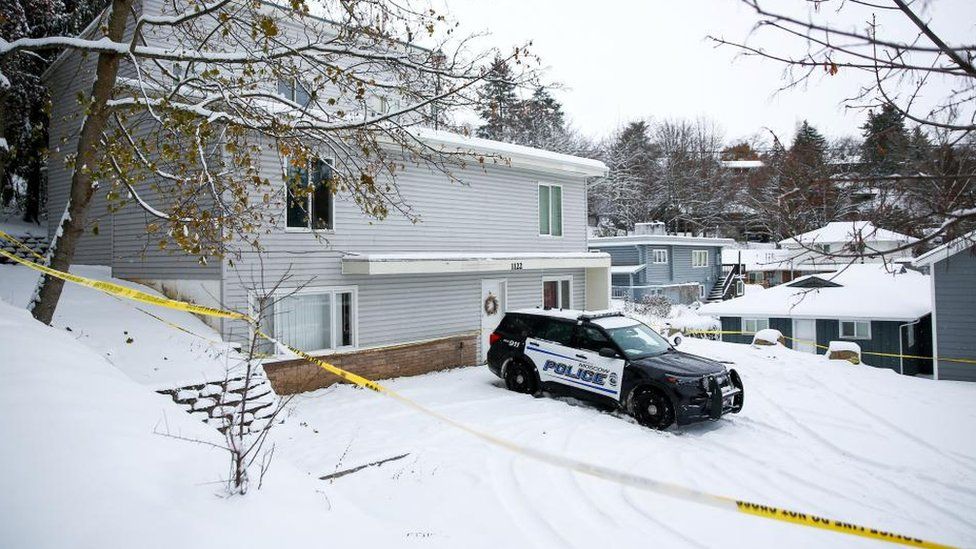ARTICLE AD BOX
 Image source, Reuters
Image source, Reuters
The murder of four University of Idaho students remains unsolved
By Bernd Debusmann Jr and Chelsea Bailey
BBC News, Washington
Despite seeking tips from the public, authorities in Idaho are warning rumours and speculation being spread by a growing army of amateur web sleuths is hindering efforts to solve the grisly slaying of four college students.
The students, all aged 20 or 21, were all found stabbed to death in a home in the town of Moscow on 13 November - a crime that has gripped US headlines.
So far, no arrests have been made in the murders of Xana Kernodle, Ethan Chapin, Kaylee Goncalves and Madison Mogen and no suspects publicly identified, prompting tens of thousands of people to go online to exchange theories and possible "clues".
But these efforts, experts say, can drain investigative resources, complicate future jury selection, encourage false confessions and bring unwanted - perhaps even dangerous - public scrutiny on innocent residents.
In the weeks since the four were found dead, dozens of Facebook groups and Reddit threads have been created dedicated to sharing the latest updates and parsing police statements or clues.
The two largest Reddit sub-threads focused on the investigation have 80,000 members, while the largest of the Facebook "case discussion" groups now has 35,000.
In the absence of more concrete details from investigators, armchair detectives and internet sleuths have begun sharing their own theories about potential suspects. In one particularly active Facebook group - with over 15,000 members and 60 posts in the last day - members were recently re-watching a livestream of a community vigil held in honour of the victims and sharing screenshots of anyone who appeared "suspicious".
On another thread, members debated whether the roommates of the victims could be suspects based on the timing of 911 calls. Police have repeatedly said do not believe the roommates were involved in the murders.
One member of the group identified herself as the mother of one of the victim's friends. She said many of her friends feel that the suspect is someone the students knew.
In a statement sent to the BBC, Moscow's police department warned that "speculation without factual backing" has stoked "community fears" and led to false facts being spread.
Already, they have been forced to publicly dispel a number of false rumours related to the investigation, including online reports that the victims were found bound and gagged and that the killings may somehow be tied to a pair of double stabbings in Washington and Oregon in 1999 and 2021.
In a separate statement, however, the department said that it is still seeking information from the public and that "there is no piece of information that is too small".
Kevin McMunigal, a former federal prosecutor and law professor at Case Western Reserve University in Ohio, told the BBC that public interest in a criminal investigation is, at best, a "mixed bag".
While the public might be able to provide tips, widespread sharing of details - verified or not - could also taint a potential jury pool if an arrest is made and the case heads to a trial.
Image source, Reuters
Image caption,Amateur investigators from around the world have been scouring for clues.
"Imagine you're trying to get jurors anywhere in the state of Idaho and you ask them if they've heard anything about this case....who's not going to be aware of it? Maybe they'll have formed views on it," he said. "The Internet is universal. How do you find people who don't know about the case?"
Mr McMunigal also said that the sharing of details could lead to false confessions.
In other cases, public attention and ire could fall on innocent people uninvolved in the case.
A man who lives near the home where the murders took place in Idaho has said told media he has faced harassment from web sleuths who suggested online that he was "strange" and perhaps involved in the case.
In some instances, the public naming of potential suspects by amateur investigators could increase the risk that police - under intense public scrutiny - focus on the wrong person, Mr McMunigal said.
"Everybody is going to be screaming at the police," he added. "That pressure could lead them to jump the gun."

 2 years ago
66
2 years ago
66








 English (US) ·
English (US) ·